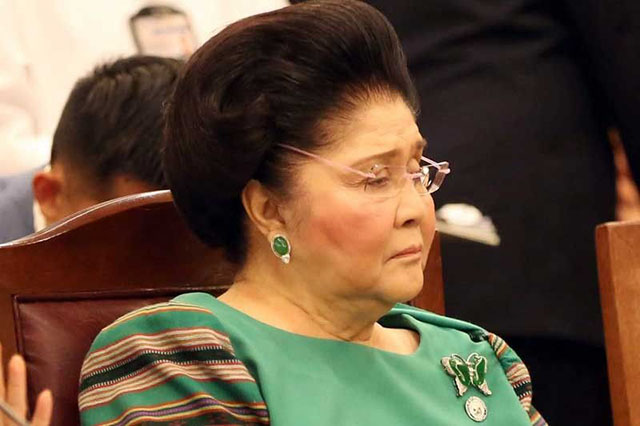Several questions were raised on the refusal of the Philippine National Police to arrest former first lady and Ilocos Norte Rep. Imelda Marcos following her conviction of a number of graft cases at the Sandiganbayan.
Philippine National Police chief Oscar Albayalde on Monday said that the country’s police force will consider the former first lady-turned lawmaker’s age and health.
“She is already elderly. We have to take in consideration her age,” Albayalde said.
He added that it was standard procedure to take into the consideration the health and age of any person before an arrest could be made.
“In any arrest, anybody for that matter, that has to be taken into consideration: the health, the age,” Albayalde added. He had previously said that Marcos would receive no special treatment following the Sandiganbayan’s decision.
The 89-year-old widow of late strongman Ferdinand Marcos was recently convicted by the Sandiganbayan Fifth Division of seven counts of graft for using her position as a member of her husband’s cabinet to create seven private organizations where she held financial interests.
“The Sandiganbayan said they have yet to issue the arrest warrant by Monday. Be rest assured that we will never be too busy from doing our mandate,” Chief Superintendent Benigno Durana Jr. said in an interview with Manila Bulletin.
Despite the PNP’s explanations, many continue to criticize the lack of action following the former first lady’s conviction.
Legal experts have also weighed in on the debate.
Human rights lawyer and De La Salle University College of Law Dean Chel Diokno in an interview with ANC recognized Marcos’ right to file her appeal and elevate the case to the Supreme Court but hoped that the high tribunal in that event would decide on the appeal “in a way that would be speedy.”
“This case was filed way back in 1991 and decided only in 2018. And I think that is way too long. I think the appeal process should not take that long either,” he said.
He added that Marcos’ age was not sufficient reason to bar her arrest, as the crimes she was convicted of took place long before she reached the age of 89.
San Beda Graduate School of Law Dean Ranhilio Aquino meanwhile reportedly argued that the warrant for Marcos’ arrest could be issued only when the motion for reconsideration she is expected to file is denied with finality.
How long until arrest?
Ombudsman prosecutor Rey Quilala earlier said that the warrant could be lifted if Marcos decides to avail of her legal remedies.
Arrests without warrant are generally unlawful and prohibited except for specific conditions under both the Rules of Procedure and jurisprudence.
Should a warrant for her arrest be issued, the office to which it was served must act upon the said warrant within ten days of receipt, according to Rule 113, Sec.4 of the Rules on Criminal Procedure.
The police or any other government organ ordered to carry out Marcos’ arrest thus cannot carry out such an order if they have yet to receive a copy of the warrant.
Marcos following application for bail also retains provisional liberty during the pendency of her appeal, under Rule 114, Sec. 5. Her bail however can be cancelled should it be found that any of the five circumstances that allow the denial of bail be found attendant in her case.
Malacañang has already dispelled concerns raised by various groups and Marcos critics that the Sandiganbayan’s conviction could be put aside by a grant of presidential pardon by President Rodrigo Duterte, who is known for warm ties with the Marcoses, explaining that the president can only exercise such power once the conviction has been decided by finality by a higher court.

